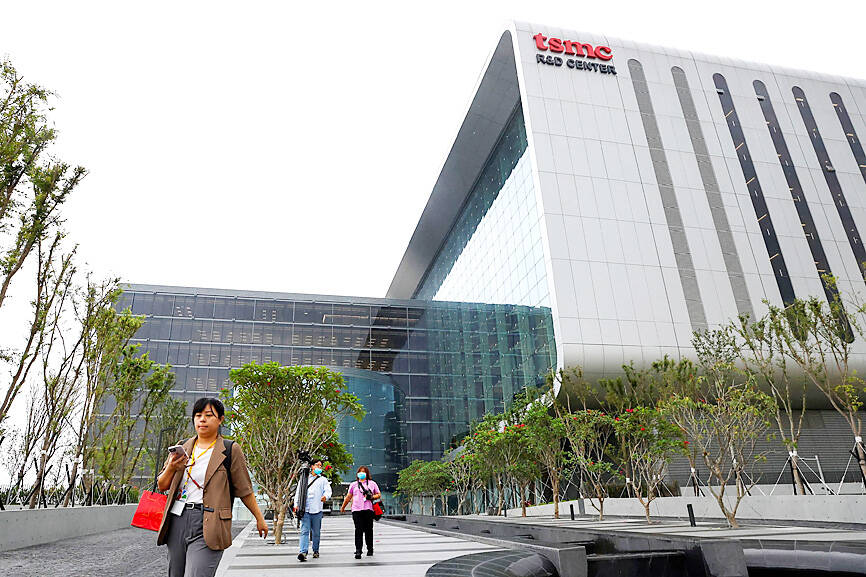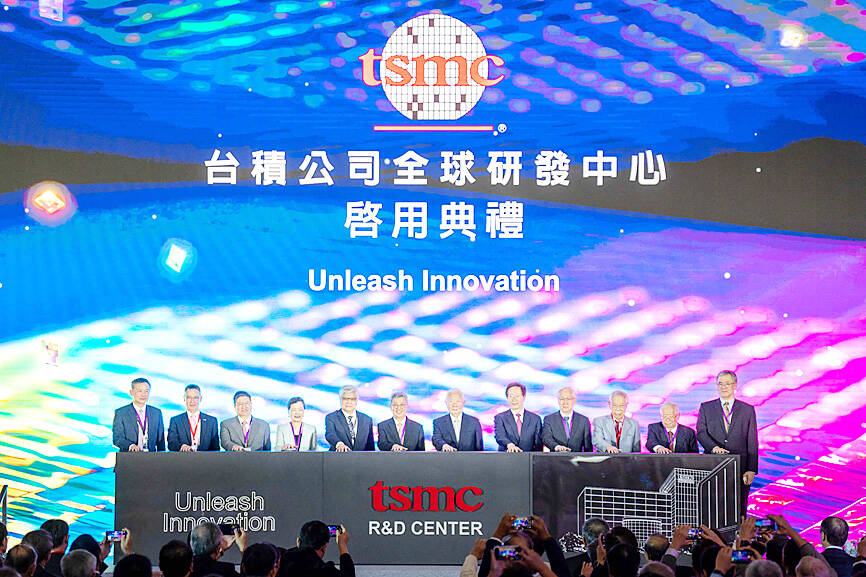Taiwan Semiconductor Manufacturing Co (TSMC, 台積電) yesterday inaugurated its new global research-and-development (R&D) center in Hsinchu to further its development of next-generation technologies, including 2-nanometer and beyond, as the world’s biggest contract chipmaker seeks to safeguard its global technology leadership.
The launch of the R&D hub demonstrates the chipmaker’s long-term commitment to investing in Taiwan and its determination to keep its roots at home, TSMC chief executive officer C.C. Wei (魏哲家) said in a speech at the inauguration.
Wei made the remarks amid concern about TSMC’s acceleration in expanding its global manufacturing footprint to the US and Japan in recent years.

Photo: Ann Wang, Reuters
The chipmaker is also considering building a fab in Germany to produce 28-nanometer chips used in vehicles in collaboration with its customers.
While TSMC’s overseas investments have sparked worries that the company might halt its development in Taiwan, Wei said that is not the case.
TSMC is expanding its overseas capacity with an aim to meet its customers’ needs, he said.

Photo: AFP / TSMC
The company expects the new R&D center to house more than 7,000 R&D engineers at full capacity by September, up from 2,200 people currently, it said.
“With the launch of the new global R&D center, TSMC will be more proactive in developing world-leading semiconductor technologies from 2-nanometer technology, 1.4-nanometer technology and smaller technologies,” TSMC chairman Mark Liu (劉德音) said.
The company said that its 2-nanometer technology would be the world’s most advanced when it is introduced in 2025, duplicating its success in bringing its 3-nanometer technology to market ahead of its competitors.
Counting Apple Inc and Nvidia Corp among its major customers, TSMC commands about a 60 percent share of the global semiconductor market.
The chipmaker said continuous investment in leading-edge technologies is the key to safeguarding its technological leadership. Last year, TSMC spent 30 percent more on R&D, totaling US$5.47 billion, compared with US$4.47 billion in 2021.
Since the company’s inception more than 30 years ago, TSMC has been determined to build its own technology, TSMC founder Morris Chang (張忠謀) said yesterday.
It was a long road for TSMC to fulfill that goal and become a global semiconductor technology leader, he said, adding that the company secured its technological leadership only after it introduced its 7-nanometer technology.
For more than 20 years, TSMC has heavily invested in R&D efforts by allocating 8 percent of its total revenue to it, Chang said.
Last year, TSMC’s R&D spending greatly surpassed the US$2 billion spent by the Massachusetts Institute of Technology, he said.

The Central Election Commission has amended election and recall regulations to require elected office candidates to provide proof that they have no Chinese citizenship, a Cabinet report said. The commission on Oct. 29 last year revised the Measures for the Permission of Family-based Residence, Long-term Residence and Settlement of People from the Mainland Area in the Taiwan Area (大陸地區人民在台灣地區依親居留長期居留或定居許可辦法), the Executive Yuan said in a report it submitted to the legislature for review. The revision requires Chinese citizens applying for permanent residency to submit notarial documents showing that they have lost their Chinese household record and have renounced — or have never

A magnitude 5.6 earthquake struck off the coast of Yilan County at 12:37pm today, with clear shaking felt across much of northern Taiwan. There were no immediate reports of damage. The epicenter of the quake was 16.9km east-southeast of Yilan County Hall offshore at a depth of 66.8km, Central Weather Administration (CWA) data showed. The maximum intensity registered at a 4 in Yilan County’s Nanao Township (南澳) on Taiwan’s seven-tier scale. Other parts of Yilan, as well as certain areas of Hualien County, Taipei, New Taipei City, Taoyuan, Hsinchu County, Taichung and Miaoli County, recorded intensities of 3. Residents of Yilan County and Taipei received

Taiwan has secured another breakthrough in fruit exports, with jujubes, dragon fruit and lychees approved for shipment to the EU, the Ministry of Agriculture said yesterday. The Animal and Plant Health Inspection Agency on Thursday received formal notification of the approval from the EU, the ministry said, adding that the decision was expected to expand Taiwanese fruit producers’ access to high-end European markets. Taiwan exported 126 tonnes of lychees last year, valued at US$1.48 million, with Japan accounting for 102 tonnes. Other export destinations included New Zealand, Hong Kong, the US and Australia, ministry data showed. Jujube exports totaled 103 tonnes, valued at

BIG SPENDERS: Foreign investors bought the most Taiwan equities since 2005, signaling confidence that an AI boom would continue to benefit chipmakers Taiwan Semiconductor Manufacturing Co’s (TSMC, 台積電) market capitalization swelled to US$2 trillion for the first time following a 4.25 percent rally in its American depositary receipts (ADR) overnight, putting the world’s biggest contract chipmaker sixth on the list of the world’s biggest companies by market capitalization, just behind Amazon.com Inc. The site CompaniesMarketcap.com ranked TSMC ahead of Saudi Aramco and Meta Platforms Inc. The Taiwanese company’s ADRs on Tuesday surged to US$385.75 on the New York Stock Exchange, as strong demand for artificial intelligence (AI) applications led to chip supply constraints and boost revenue growth to record-breaking levels. Each TSMC ADR represents